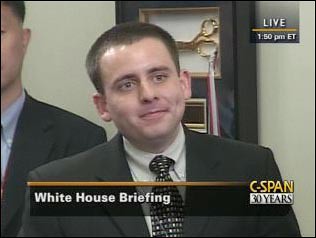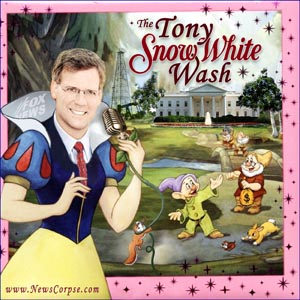Ana Marie Cox posted a brief item today about the reportorial brain power that’s wasted at White House press briefings:
“It’s not that the reporters covering the president are bad at their jobs. Most are experienced journalists at the top of their game — and they’re wasted at the White House, where scoops are doled out, not uncovered. The day of a typical White House correspondent consists, literally, of waiting to be told things.”
That’s an excellent point. Why would news organizations want to assign their top talent to staged briefings where they would have almost no opportunity to break a significant story? The only problem with Cox’s article is that it is at least two years too late.
In May of 2006, I posted an item based on the musings of NYU journalism professor, Jay Rosen. The article addressed comments made by Bush Chief of Staff, Josh Bolton, who seemed to be considering ending the White House briefings. Rosen pointed out that ending the briefings was a two way street that could just as easily be exercised by the press. All they would have to do is stop showing up. Rosen went further to propose what is still an appealing alternative.
“Send interns instead to occupy the seats without asking questions or filing reports. That means no correspondents at the two daily briefings, none on the President’s plane, none at his public appearances. (Except for foreign trips where other heads of state might speak.) Let the White House publicize itself.”
If not interns, junior reporters would certainly be able to perform the stenographic services required in the briefing room. They could even ask pretty decent follow-up questions when necessary. In the meantime, the newsroom all-stars could be out raking up muck like they are supposed to be doing; like they were trained to do; like we, the news consumers, want them to do. Should anything of consequence occur (i.e. the President introduces his new puppy), it could be texted to a more experienced hand without even leaving the chair. But when was the last time something important was divulged in one of these gatherings?
Certainly the White House manipulates these briefings for their own purposes, but in a sense, that’s their job. They are political by definition. The press, however, have a thoroughly different job – to coax transparency from government officials who are usually adverse to volunteering it. But rather than fulfilling that mission, much of the White House press corps is more concerned with scoring invites to cocktail parties and dinners with the same officials they are supposed to be covering.
All too often, White House press events are exploited by ego-driven reporters who like to see their mugs on TV. For this reason they frequently pose questions that are artificially provocative in order to raise their buzz quotient. At the other end of the spectrum are the partisan hacks that seek to make a name for themselves by embarrassing the press secretary or the President. Just last week, this guy asked a question with a comically false premise that was dripping with derision:
 “Tomorrow is tax day and a number of conservative groups are organizing these so called “tea parties” across the country; there are going to be grassroots uprising revolts against the administration’s policies so far. Is the President aware that these are going on and do you have any reaction to this?”
“Tomorrow is tax day and a number of conservative groups are organizing these so called “tea parties” across the country; there are going to be grassroots uprising revolts against the administration’s policies so far. Is the President aware that these are going on and do you have any reaction to this?”
[By the way, if anyone knows who this guy is, please leave his name in comments. I have been unable to identify this Jeff Gannon wannabe] … [Update: This may be Jim Geraghty of the National Review]
As for the notion of reassigning cub reporters to the briefings, it’s still a good idea, but not one likely to be implemented any time soon. Too bad. It’s shame we have to watch the people who ostensibly earned the top positions in their field, sitting in rows like school children being lectured by the teacher. And if they really are the best, then who does that leave to do the real work of pounding the pavement and looking under rocks? It’s a system that rewards mediocrity.


 Jay Rosen at
Jay Rosen at